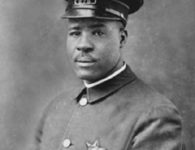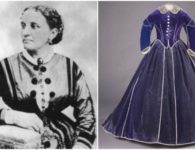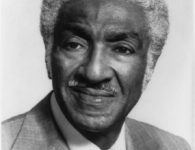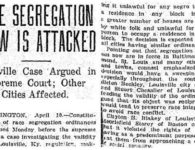Photo credits: Afro Newspaper/Gado/Getty Images
On January 18, 1951, the late Democratic U.S. Congressman Elijah E. Cummings (pictured) was born in Baltimore, Maryland.
In 1973, he got a B.A. in political science from Howard University (Washington, D.C.), and in 1976, he earned a J.D. from the University of Maryland (College Park). Cummings, one of seven children parented by a working-class couple who had relocated from a farm in South Carolina, grew up in a leased house. However, Cummings frequently recalled how his family resorted to “scrimping and saving” so they could acquire homeownership in a desegregated region. When his family unit moved into a home of its own in 1963, Cummings was only twelve years of age. Up until that time, Cumming said that as a child, he “never played on grass before.” In 1973, he earned a B.A. in political science from Howard University (Washington, D.C.). In 1976, Cummings went on to earn a J.D. from the University of Maryland’s law school (College Park).
Seven years after his law school graduation, Cummings was elected to the Maryland State House of Delegates for the first time (1983). Eventually, serving for more than a decade’s share of years in Maryland’s state legislature qualified Cummings for a leadership position within his side of the two-pronged government body. Cummings was elected speaker pro tem of the Maryland House of Delegates in 1995. At that time, he earned the highest legislative position ever achieved by a black Marylander. Cummings had a reputation as an impassioned liberal and a good consensus finder during his thirteen years in Maryland’s state legislature. The borders of Cummings’s constituency surrounded the primarily black enclave of West Baltimore. He firmly represented his constituents for the purpose of giving them access to health care.
Cummings was also a major proponent of enforcing gun control in high-crime urban areas. He additionally worked to engage corporate sector-based companies in government-private sector collaboration efforts to enhance urban economic development as well as local schools. Cummings was instrumental in the battle to prohibit liquor marketing from being plastered on inner-city billboards. Cummings also pioneered measures in the Maryland House to combat HIV/AIDS. He worked with unrelenting focus to establish a “boot camp” program to assist former jail inmates so they could find jobs. As a leading lawmaker, Cummings advocated for the world wide web to be connected to all local schools, particularly inside institutions where racial minorities were the majority student demographic.
In February 1996, Kwesi Mfume, Maryland’s influential Democratic congressional incumbent, resigned from the United States House of Representatives. The distinguished Mfume left the U.S. Congress to reign as president of the National Association for the Advancement of Colored People (NAACP). In the subsequent Democratic election primaries, which were held to fill the seat Mfume vacated, Cummings defeated 26 black and white opponents. Then, in April 1996, he gave Republican Kenneth Konder a shellacking by winning over 80% of all tallied votes in the general election. Cummings’s decisive victory, which rocketed him to national prominence, served as a favorable way to cap off Mfume’s legacy as a renowned black member of America’s 104th Congress.
To the dismay of even his own fellow Democrats in Congress (who were moderates that worked on building bipartisan legislation), Cummings supported his party’s more radical left-wing. This was the case throughout his debut annual period as a rookie Congressman. Cummings opposed compromising with status quo poverty reformers. In spite of the unwavering support exhibited by predominantly right-wing GOP conservatives who controlled Congress, Cummings strongly countered them—by opposing their efforts to make illegal immigrants ineligible for public education. Cummings was also a vociferous opponent of allowing firms to provide compensatory time off in lieu of further salary. He supported pro-choice lobbyists who demanded the protection of women’s abortion rights.
Cummings was ardently against designating term limits for elected officials. The left-leaning Congressman also fought to provide unilaterally U.S.-provided foreign assistance and development funds without imposing abortion restrictions on America’s overseas recipients. This was another left-wing measure that the ruling conservative leaders of the U.S. House and U.S. Senate vehemently fought back against. He supported pro-choice lobbyists who demanded the protection of women’s abortion rights. Cummings was ardently against designating term limits for elected officials. The left-leaning Congressman also fought to provide unilaterally U.S.-provided foreign assistance and development funds without imposing abortion restrictions on America’s overseas recipients.
This was another left-wing measure that the ruling conservative leaders of the U.S. House and U.S. Senate vehemently fought back against. Another substantive component of Cummings’s legacy on Capitol Hill also dealt with foreign policy. Cummings publicly endorsed and activated his anti-war stance in October 2002. He was one of the 156 congressional legislators (23 U.S. Senators and 133 U.S. House Reps.) who voted against Joint Resolution 114—a hotly contended legislative agenda item that justified U.S. military action to remove the ruling regime of Saddam Hussein, the late former President of Iraq. Ultimately, the Republican-led White House of President George W. Bush and 373 members of Congress legalized Joint Resolution 114. The road to unspeakable carnage, at the Bush II administration’s brutal hand, had already been paved.
However, in the months prior to America’s devastating March 2003 aerial bombing campaign in Iraq, followed by a subsequent U.S. ground invasion, Cummings’s debate persisted.
He asserted that pro-war neo-conservative hawks were acting on false pretenses. Cummings showed that the nation’s top civilian and military failed to prove their case for war. He called them out on their reckless exaggerations. His actions raised doubt over claims that Iraq’s government had stockpiles of globally banned weapons of mass destruction. In hindsight, Cummings’s past assertions of the U.S.-led war effort and the decades-long occupation there proved to be correct. No globally banned weapons of mass destruction were ever found — long after the U.S. disintegrated Hussein’s military, his central government, and Iraq’s civilian infrastructure. Day and night, America’s countless aerial bombing raids throttled Iraqi cities nationwide for years. Heavy-handed security sweeps conducted by U.S. ground troops went on simultaneously.
While constantly stifled under the heat of U.S. firepower, millions of Iraq’s most defenseless citizens were killed indiscriminately.
Nonetheless, Cummings also preeminently warned about the burdensome costs of an Iraq-based war — that America ended up paying for in toil exclusively. Like a biblical prophet, Cummings preliminarily calculated a falling superpower’s future consequences — as a result of its pre-emptive massacre — inside a geographical powder keg that was already volatile. Cummings knew that targeting Iraq for such a massive war effort would decimate the U.S. military’s operating capacity, cause thousands of American deaths, and wreck the U.S. economy.
Rep. Cummings was elected to his 12th and final term as a U.S. Congressman in November 2018.
He was also named chairman of the House Committee on Oversight and Reform. This post gave Cummings the power to investigate the former presidential administration of Donald J. Trump. Trump was a flamboyant Republican who was crass and adversarial toward Cummings. He continued his public antics even as ranking members of his cabinet and advisory staffers were being criminally indicted left and right. In response to Trump, Cummings took the high road — instead of feeding into Washington’s political madness. Furthermore, the dynastic House Democrat was also a member of Sigma Pi Phi. As his final term went on, Cummings began suffering from severe heart problems. He died on October 17, 2019, at the Johns Hopkins Hospital in Baltimore, Maryland. Cummings was 68 years of age at the time of his passing.
“Your lives are in front of you, and so I beg you to go out and stand up for this democracy,” he told crowds of college graduates at Morgan State University during a spring 2019 commencement speech.
The late Congressman is survived by his wife, Maya Rockeymoore Cummings, Maryland’s Democratic Party Chair, and their children.





















No comments